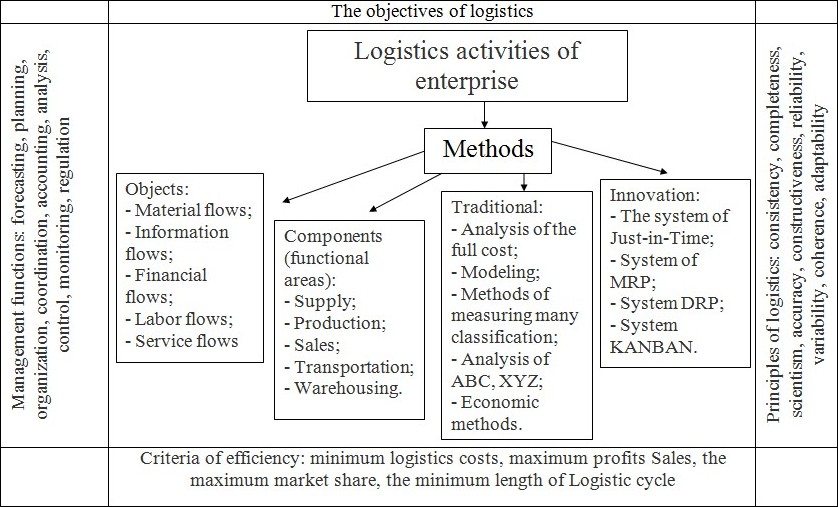Abstract
Introduction
Modern companies use logistics as a new, progressive thinking, the most effective methodology for industrial and economic, business and commercial activity, which offers great opportunities and prospects for increasing their efficiency and competitiveness. The particular relevance in the business becomes a problem to establish an adequate market economy, the sphere of circulation, serving the movement of material and informational flows. Its solution requires to new approaches using the concepts of logistics, which can not only significantly affect the efficiency of businesses by improving the quality of supply and reduce logistics costs in circulation, but also allow you to obtain competitive advantage in the market.
Innovative methods of managing the logistics activities of the company
In the first section "Theoretical Foundations of logistics activities using innovative methods" there was defined features using logistic approach for enterprises in innovative type of economic development. Logistics activities of the enterprise lies in the management of flow processes within the company, taking into account external conjectural conditions . This control is implemented on the basis of the functions of forecasting, planning, organization, coordination, accounting, analysis, monitoring and regulation.

KANBAN system was developed by the Corporation "Toyota Motors" (which Japanese means "card" from Japanese). The means of information transfer in the system is a special card "kanban" in a plastic envelope. There are two types of cards: selection and production order. In selection card indicates the number of parts (components, semi-finished products) which have to be taken in the previous section processing (folds), while in the production order card the number of parts to be manufactured (assembled) on the previous production area. Despite some differences above micrologistics systems, a defining element in all these systems are demands, and consequently, sales.
The second section will apply the method of ABC-and XYZ - analysis, inventory and logistic management system sales entities. To ground the system of logistics activities in the business and to develop methodological approaches to the process of information and logistics systems companies.
The third section will improve the information and logistics systems entities and justify the cost-effectiveness of innovative logistics management activities. Also planned to offer innovative methods of logistic business entities.
At the time of writing this abstract the master's work is not yet complete. Final completion: is December 2012. The full text of the work and materials on the topic can be obtained from the author after this date.
References
Карий О.І. Умови формування логістичних інформаційних систем / О.І. Карий // Проблеми економіки і управління: вісник НУ
Львівська політехніка
. – № 425. – Львів: Національний університетЛьвівська політехніка
, 2009. – С. 329–334.Ларіна Р.Р. Формування та забезпечення надійності регіональних логістичних систем: монографія / Р.Р. Ларіна. – Донецьк: Норд-Пресс, 2009. – 284 с.
Окландер М.А. Логістична система підприємства: монографія / М.А. Окландер. – О.: Астропринт, 2010. – 312 с.
Кацюба Н.Л, Бондарева И.А. Організація логістичного управління інноваційною діяльністю підприємства. – Донецьк: ДонНТУ, 2010.
Логистика: современные тенденции развития
// Логистика. – № 2. – 2009. – С. 28-29.Аленичев В. Логистическая концепция PBL и решения IFS / В. Аленичев// Логистика. – № 1. – 2009. – С. 22-23.
Носов А. О современном состоянии рынка транспортно-логистических услуг / А. Носов // Логистика. – № 1. – 2010. – С. 14.
Орел О. О соотношении эффективности и качества логистической деятельности предприятия / О. Орел // Логистика. – № 3. – 2010. – С. 18-20.
Жалило Я.А. Щодо чинників впливу на інноваційну поведінку підприємницьких структур в Україні / Я.А. Жалило // Прометей: регіон. зб. наук. праць з економіки. – 2006. – № 3 (21). – С. 82-86.
Крикавський Є.В., Чухрай Н.І. Логістика: компендіум і практикум – К.:Кондор, 2006. – 336 с.
Корпоративная логистика. 300 ответов на вопросы профессионалов / Под общ. и научн. ред. проф. В.И. Сергеева. – М.: ИНФРА-М, 2006. – 976 с.
Крикавський Є.В. Логістика. Основи теорії: Підручник – 2-ге вид., доп. і переробл. – Львів: «Інтелект-Захід», 2006. – 456 с.
Уотерс Д. Логистика. Управление цепью поставок: Пер. с англ. – М.: ЮНИТИ-ДАНА, 2003. – 503 с.
Морозов О.Б. Основы логистической теории в практике успешного ведения современного бизнеса: Лекционные материалы к курсу. – СПб., 2005. – 214 с.
Теренина И.В. Инновационная логистика в строительном комплексе России – Ростов-на-Дону: Изд-во СКНЦВШ, 2007. – 208 с.
